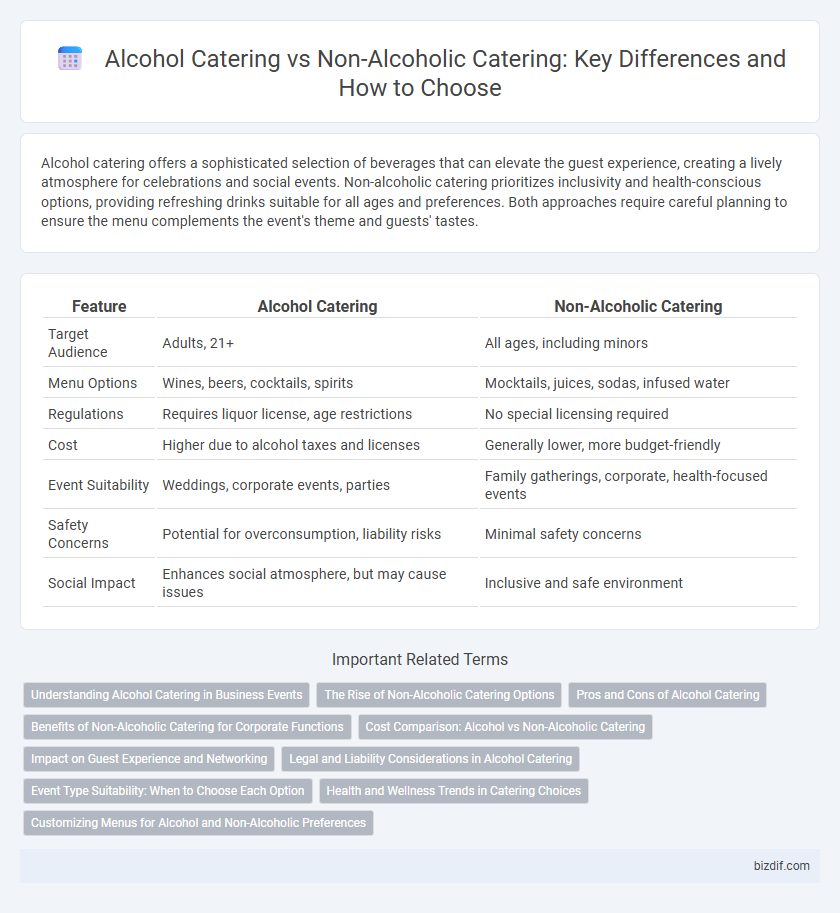Alcohol catering offers a sophisticated selection of beverages that can elevate the guest experience, creating a lively atmosphere for celebrations and social events. Non-alcoholic catering prioritizes inclusivity and health-conscious options, providing refreshing drinks suitable for all ages and preferences. Both approaches require careful planning to ensure the menu complements the event's theme and guests' tastes.
Table of Comparison
| Feature | Alcohol Catering | Non-Alcoholic Catering |
|---|---|---|
| Target Audience | Adults, 21+ | All ages, including minors |
| Menu Options | Wines, beers, cocktails, spirits | Mocktails, juices, sodas, infused water |
| Regulations | Requires liquor license, age restrictions | No special licensing required |
| Cost | Higher due to alcohol taxes and licenses | Generally lower, more budget-friendly |
| Event Suitability | Weddings, corporate events, parties | Family gatherings, corporate, health-focused events |
| Safety Concerns | Potential for overconsumption, liability risks | Minimal safety concerns |
| Social Impact | Enhances social atmosphere, but may cause issues | Inclusive and safe environment |
Understanding Alcohol Catering in Business Events
Alcohol catering in business events involves providing a curated selection of alcoholic beverages tailored to the event's theme and guest preferences, enhancing networking and social interactions. Compliance with local liquor laws and responsible service practices are critical to ensure a safe and enjoyable experience. Offering premium spirits, wines, and craft cocktails can elevate the event atmosphere, while trained staff manage consumption and maintain professional standards.
The Rise of Non-Alcoholic Catering Options
The rise of non-alcoholic catering options reflects growing consumer demand for inclusive and health-conscious event experiences, with venues increasingly offering sophisticated alcohol-free beverages such as mocktails, artisanal sodas, and infused waters. Non-alcoholic catering enhances guest engagement by providing diverse drink selections that cater to designated drivers, pregnant guests, and individuals abstaining from alcohol. This trend drives innovation in the catering industry, promoting wellness-focused event planning while expanding market reach beyond traditional alcohol-centric services.
Pros and Cons of Alcohol Catering
Alcohol catering enhances event ambiance by offering diverse beverage options that encourage social interaction and elevate guest experience, making celebrations more memorable. However, managing alcohol service requires strict adherence to legal regulations, increases event costs, and risks potential overconsumption, which can lead to safety concerns. Non-alcoholic catering avoids these issues, providing a safer and more inclusive environment but may lack the festive appeal of alcoholic offerings.
Benefits of Non-Alcoholic Catering for Corporate Functions
Non-alcoholic catering enhances corporate functions by promoting a more inclusive and professional environment where all attendees feel comfortable and engaged. It reduces liability concerns and ensures compliance with company policies and local regulations, supporting a safer event atmosphere. Offering a variety of sophisticated, alcohol-free beverage options also caters to health-conscious individuals and those abstaining from alcohol, improving overall guest satisfaction.
Cost Comparison: Alcohol vs Non-Alcoholic Catering
Alcohol catering typically incurs higher costs due to licensing fees, alcohol procurement, and specialized staff for service and safety compliance. Non-alcoholic catering usually offers a more budget-friendly option, with expenses centered around beverages like juices, sodas, and specialty mocktails. Cost comparison highlights that while alcohol catering adds complexity and price, non-alcoholic services provide a cost-effective and inclusive choice for event planners.
Impact on Guest Experience and Networking
Alcohol catering can enhance guest experience by creating a relaxed atmosphere that encourages social interaction and networking, often resulting in more dynamic and engaging events. Non-alcoholic catering ensures inclusivity for guests who prefer or require alcohol-free options, promoting a comfortable environment without compromising on quality or enjoyment. Both approaches significantly influence the overall mood and networking opportunities, with the choice depending on the event's objectives and guest preferences.
Legal and Liability Considerations in Alcohol Catering
Alcohol catering involves strict legal regulations including obtaining appropriate liquor licenses, verifying the age of all guests, and adhering to local alcohol service laws to prevent underage drinking and overconsumption. Liability considerations such as dram shop laws hold caterers and event hosts accountable for alcohol-related incidents, necessitating comprehensive insurance coverage and staff training on responsible alcohol service. Non-alcoholic catering minimizes these legal risks, offering greater flexibility and fewer regulatory requirements while ensuring a safe environment for all attendees.
Event Type Suitability: When to Choose Each Option
Alcohol catering suits adult social events like weddings, corporate parties, and celebrations where guests expect a variety of drink options to complement the atmosphere. Non-alcoholic catering is ideal for family-friendly gatherings, daytime events, and health-conscious or cultural occasions where sobriety and inclusivity are prioritized. Selecting the appropriate catering depends on guest demographics, event timing, and the desired ambiance to ensure a comfortable and enjoyable experience.
Health and Wellness Trends in Catering Choices
Alcohol catering often faces scrutiny due to health and wellness trends emphasizing moderation and responsible consumption, leading many event planners to prefer non-alcoholic options. Non-alcoholic catering, featuring mocktails, herbal infusions, and fresh juices, aligns with increasing demand for healthier alternatives that support hydration and wellness. These choices also accommodate diverse dietary preferences and promote a safe environment, reflecting a broader cultural shift towards mindful consumption in event catering.
Customizing Menus for Alcohol and Non-Alcoholic Preferences
Customizing catering menus involves careful consideration of both alcohol and non-alcoholic preferences to ensure an inclusive experience for all guests. Alcohol catering requires selecting beverages that pair well with menu items, such as wines complementing specific dishes or signature cocktails designed to enhance flavors. In contrast, non-alcoholic catering emphasizes creative options like mocktails, artisanal sodas, and infused waters, offering variety and sophistication while accommodating guests who prefer or require alcohol-free choices.
Alcohol Catering vs Non-alcoholic Catering Infographic

 bizdif.com
bizdif.com